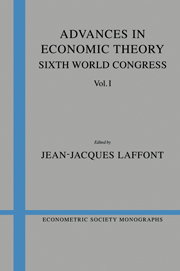Book contents
- Frontmatter
- 1 Foundations of game theory
- 2 Refinements of Nash equilibrium
- 3 Explaining cooperation and commitment in repeated games
- 4 Repeated games: cooperation and rationality
- 5 Implementation, contracts, and renegotiation in environments with complete information
- 6 Implementation in Bayesian equilibrium: the multiple equilibrium problem in mechanism design
1 - Foundations of game theory
Published online by Cambridge University Press: 05 January 2013
- Frontmatter
- 1 Foundations of game theory
- 2 Refinements of Nash equilibrium
- 3 Explaining cooperation and commitment in repeated games
- 4 Repeated games: cooperation and rationality
- 5 Implementation, contracts, and renegotiation in environments with complete information
- 6 Implementation in Bayesian equilibrium: the multiple equilibrium problem in mechanism design
Summary
ANTEDILUVIA
Writing on the foundations of game theory is a Herculean task. I don't know which of the labors of Hercules provides the most apt metaphor. It is tempting to cite the Augean stables, which housed three thousand oxen but had not been cleaned for thirty years, but this would imply too harsh a judgment. The nine-headed Hydra, which grew two heads for each that was struck off, would do very well for a piece on refinements of Nash equilibrium, but this task has fallen to Eric van Damme (1990). I shall therefore settle for the wrestling match with the giant Antaeus, although I fear his feet are so firmly entrenched that it would truly take a Hercules to move them.
In brief, I believe the foundations of game theory to be a mess. Much of what we say in defending what we do does not hang together properly. Even when something coherent is on offer, it is hard to find two game theorists who are able to agree on whether it is right. This does not mean that the models game theorists have developed are worthless. As Aumann (1985) put it, while lecturing in Finland:
the ordinary laws of economic activity apply to our fields as well. The world will not long support us on our say-so alone. We must be doing something right, otherwise we wouldn't find ourselves in this beautiful place today.
I am not sure that I share Aumann's confidence in the laws of economic activity, but I agree that “we must be doing something right,” and that it would be folly to abandon the insights that game theory has brought to economics on the grounds that foundational issues remain unresolved. After all, people formulated correct and useful theorems in mathematics long before proper logical foundations for the subject were developed. Why should the same not be true of game theory?
- Type
- Chapter
- Information
- Advances in Economic TheorySixth World Congress, pp. 1 - 31Publisher: Cambridge University PressPrint publication year: 1993
- 4
- Cited by

